What is Sloww? I’m always thinking about this question.
Sloww continues to evolve over the years, but everything is still rooted in the seed that started it. This post is intended to give you my latest thinking about where Sloww has been and where it’s headed.
I’m also interested in hearing your thoughts: what does Sloww mean to you? There’s a section at the end of the post with a request to leave a comment or get in touch with me via email or social media.
Post Contents: Click a link here to jump to a section below
- What is Sloww?
- How has Sloww stayed the same?
- How has Sloww evolved?
- Where is Sloww going?
- Why the name “Sloww”?
- Reader Feedback Request
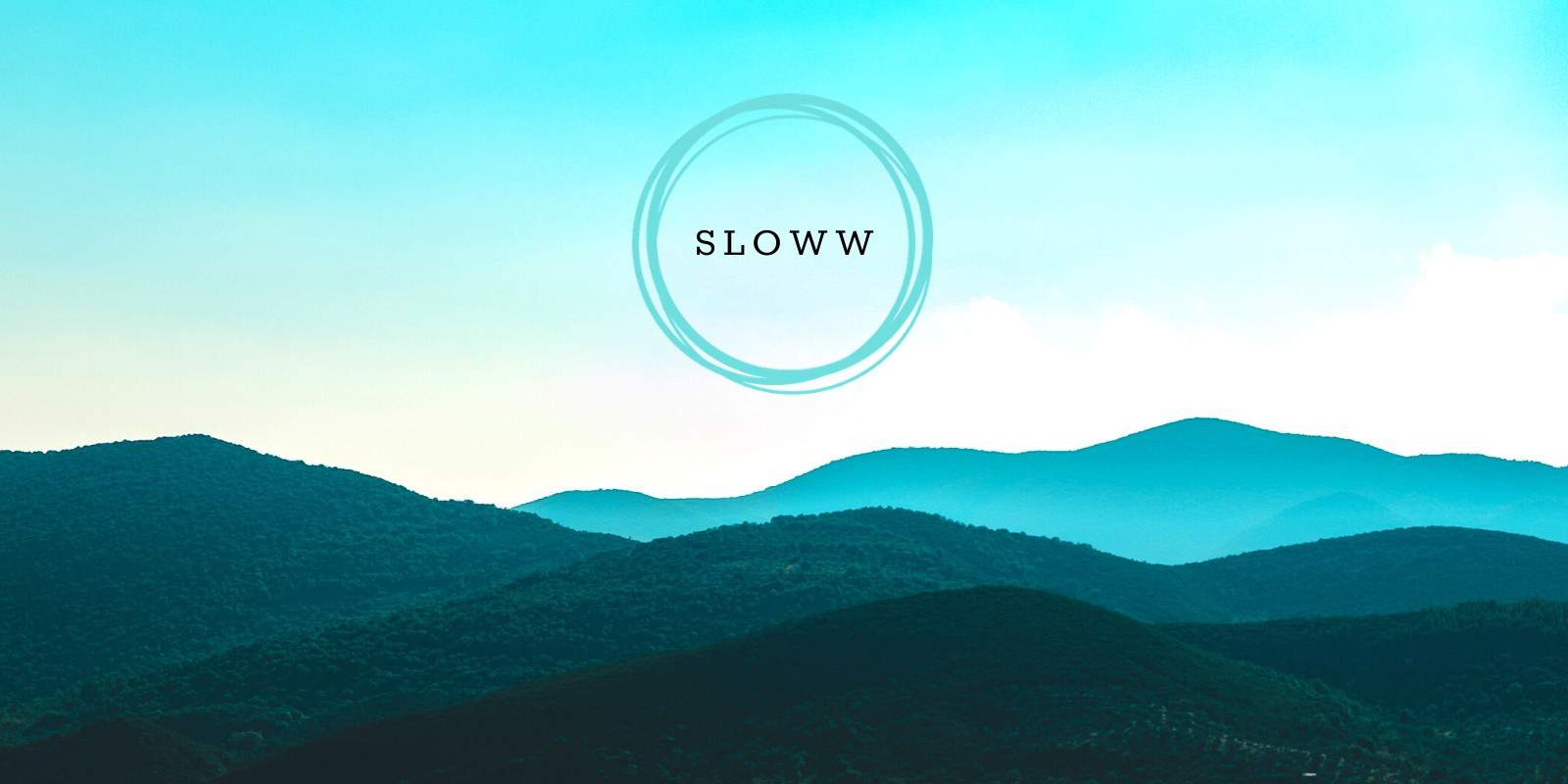
What is Sloww?
At its highest level:
- Who: Hi, I’m Kyle 👋
- When: Sloww has existed from late 2015 – today (site launched in mid-2017).
- Where: Sloww has a global reach (I’m personally based in the USA).
- Why: Sloww shares the art of living with students of life.
- How: Sloww synthesizes lifelong learning that catalyzes deeper development.
- What: Sloww is creating the web’s deepest guide to the world’s wisdom through an interdisciplinary study across diverse yet interconnected disciplines.
What I do:
Everything you see on Sloww is a result of my existential crisis and a reflection and record of my journey since then. Sloww is essentially my public, digital, “commonplace book” where I’ve attempted to combine and align everything about myself: my personality + my purpose + my play + my philosophy + my philanthropy.
The approach I take is: self-directed + syntopical reading + summarizing + synthesizing (as a thinking style and writing style) + sharing.
A big epiphany along the way was realizing that not only can thinking be a passion, it is my primary passion. But, I’m not a professor, philosopher, psychologist, sociologist, anthropologist, scientist, mystic, or guru. I’m an interconnector across all those humans and many more. Technically, I guess I’m an “independent interdisciplinary integrator” (“independent” because I work solo, “interdisciplinary” because I’m tackling the art of living which crosses all disciplines, and “integrator” because the whole point is to synthesize new perspectives, understanding, and wisdom). You may be familiar with similar and often synonymous terms like autodidact, philomath, generalist, comprehensivist, knowledge networker, and cognitive explorer. To make things easy, you can just call me a “synthesizer” or “synthesist.”
Some may view it as a negative that I’m not credentialed with special letters before or after my name (e.g. Dr, PhD, etc). But, I view it as a positive because my mind isn’t siloed in one specific discipline. I greatly appreciate the efforts of all specialists, but my mind seems to naturally operate as a generalist. Not only is my internal mind without disciplinary constraints, but I have no external appearances to keep up either because I’m not in academia. Another big positive is that I’m not “bought and paid for”—I’m self-employed and the sole employee, report to no one, and don’t receive money from anyone but those who purchase my products/services. I’m not operating off of someone else’s funding who has a hidden agenda or perverse incentives. As icing on the cake, I’ve never personally been extrinsically motivated by money. Everything I do has always been personal development first, and business development as a byproduct. What does all this mean? It means I can and do honestly share anything and everything that I’m actually thinking, experiencing, living, and learning without holding anything back.
I’m a self-education entrepreneur. More specifically I’m pursuing the path(s) of:
- solopreneur: it’s just me over here 👋
- edupreneur: what I do could be considered part of the online learning/e-learning space
- infopreneur: what I create are digital info/knowledge products like eBooks, Premium content, and courses (“d-commerce” as opposed to physical products or “e-commerce”)
- innerpreneur: what I prioritize is personal development, and business development is just a byproduct (could also be considered “enlightened entrepreneurship,” “conscious capitalism,” “intentional business,” or “spiritual business”)
There’s no operating manual for life, but life is an open book test. We’re all copying the best of those who came before us and “standing on the shoulders of giants.” I do all the homework—questioning, researching, curating, reading, note-taking, summarizing, synthesizing, writing, creating, and sharing. You get all the highlights—so you spend less time on all those things and more time learning, practicing, and mastering.
What you get:
Sloww is a trusted resource of lifelong learning that guides you to see and understand yourself and the world in new ways—catalyzing your deeper development and transforming your entire life.
You get high wisdom-per-word content so you can get wise in less time:
- Sloww Blog (Free): Hundreds of posts covering the world’s deepest knowledge.
- Sloww Sunday Newsletter (Free): 100+ issues featuring the most interesting content on the web.
- Book Summaries (Free): 100+ high-quality, detailed, nonfiction book summaries.
- Book Recommendations (Free): 50+ best books I’ve read to date.
- Reading List (Free): 400+ books selectively curated over the years.
- Hierarchy of Happiness eBook (Free): 100+ perspectives on how to be happy physically, mentally, and spiritually.
- Ikigai 2.0 Life Purpose eBook: A step-by-step guidebook to finding life purpose and making money meaningfully (plus bonus workbook).
- Mini Mind: 365 daily emails of bite-size brain food.
- Sloww Premium: 1000+ global members from 50+ countries get access to exclusive content and infographics.
- Sloww Society Community: A priceless part of the Sloww Premium membership to connect with other students of life.
- Online Courses: Coming soon for each “Sloww Stage” mentioned below!
Sloww is more comprehensive than virtually anything else out there. Here’s where it fits in your info diet:
- Samplers = Social media content, podcasts, YouTube videos, short-form blogs, etc.
- Heavy Appetizers = I feel like this is Sloww’s sweet spot. There seems to be a gap online between short-form blogs (300-1,000 word posts) and long-form books (50,000-100,000+ words). I’ve realized many of Sloww’s articles fall somewhere between 2,000-8,000 words. In a digital world of superficial content, this deeper level can better communicate deep, timeless insights. It also allows for connections across insights. Sometimes digesting a heavy appetizer will be enough on its own, and other times you’ll still want an entrée.
- Entrées = Books, source material, etc.
No matter where you are in your journey, Sloww is your go-to guide to the art of living fully alive.

How has Sloww stayed the same since the beginning?
Learning and development has been the foundation of everything from the very beginning.
When I was deep in my existential crisis in late 2015, my natural instinct was to question everything and start searching for answers. Searching led to researching which led to a lot of reading. Reading led to notetaking and summarizing. The more I learned, the more I started to analyze. And, ultimately, it all converged on synthesizing.
The visual below shows how a lifelong learning structure supports all deeper development stages. This lifelong learning is considered “horizontal development” (or “translation”/”transfer”) because it’s adding new skills, information, and knowledge to your current “stage” of mind—as opposed to deeper development which is considered “vertical development” (or “transformation”) because it’s accessing new worldviews, perspective-taking, and meaning-making. This will make more sense as the blanks are filled in below, but here’s more about the relationship between horizontal and vertical development if you’re interested.

How has Sloww evolved over time?
I’ve observed at least four stages in Sloww’s evolution.
Sloww Stage 1: Intentional Living
Stage 1 Inquiring Question:
- “How do I design a lighter life?” Asking deep questions and learning (Stage Support above) initially lead to discovery of alternative lifestyle designs and more intentionality in life (Stage 1). For most people, life is heavy in both space and time—a combination of clutteredness (relationship with physical space) and busyness (relationship with psychological time). Sloww supports slowing down and simplifying in a fast, materialistic world because this is the seed/gateway to everything else: subtracting the superficial “stuff” (physical and psychological clutter), shifting inward where we can meet life face-to-face, and creating the inner space for all the transformation that comes next.
Stage 1 Learning Focus:
- Shifters focusing on the ‘more crisis’ by downshifting from external to internal (study subjects include: slow living, unbusyness, simple living, voluntary simplicity, downshifting, decluttering, minimalism, digital minimalism, financial independence, lifestyle design, essentialism, etc).
Stage 1 Developing Self:
- Self-Shifting: Who am I? I thought I was all this ‘stuff outside me’ (my body, resume, job title, salary, net worth, house, car, clothes, etc). Now, I think I am all this ‘stuff inside me’ (my mind, personality, strengths, beliefs, principles, values, morals, etc).
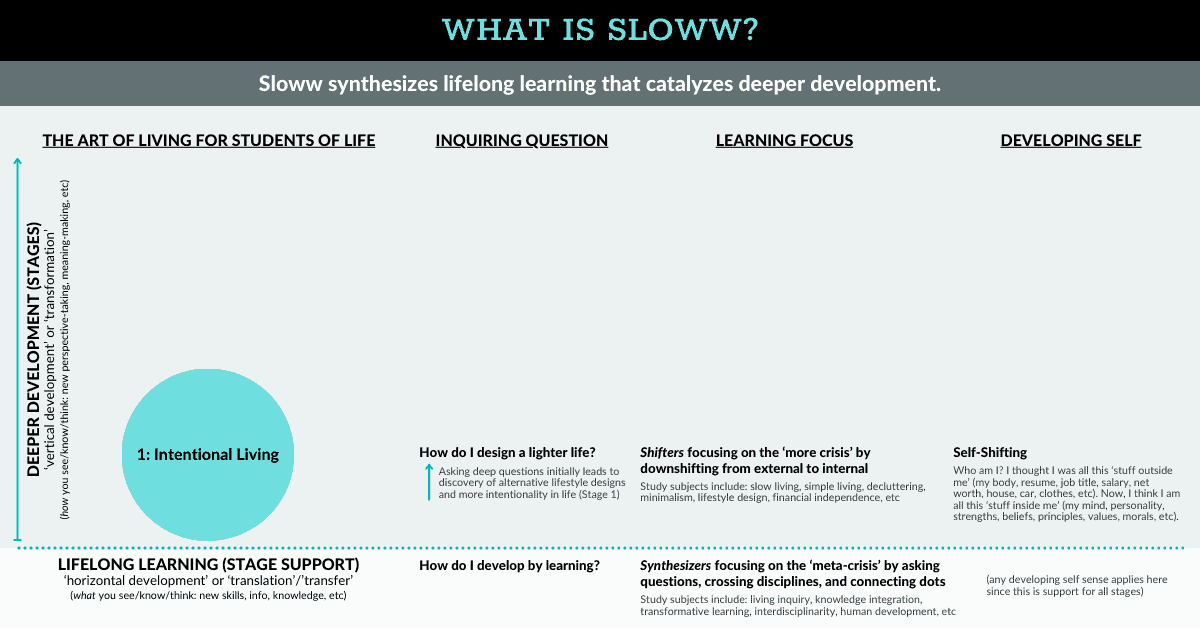
Sloww Stage 2: Life Purpose
Stage 2 Inquiring Question:
- “How do I find a higher purpose?” More inner space (Stage 1) leads deeper into self-discovery and finding directionality in life (Stage 2). Humans (individually) and humanity (collectively) seem to be in the midst of a meaning crisis. Sloww promotes finding purpose because there’s not much more important than meaning in life but no one taught us how to find it.
Stage 2 Learning Focus:
- Seekers focusing on the ‘meaning crisis’ by giving oneself uniquely beyond oneself (study subjects include: existential crisis, life purpose, ikigai, meaning of life, death, happiness, self-actualization, etc.
Stage 2 Developing Self:
- Self-Actualizing: Who am I? I am my purpose that aligns and actualizes my mind (my personality + my passion + my play + my philosophy + my philanthropy, etc).
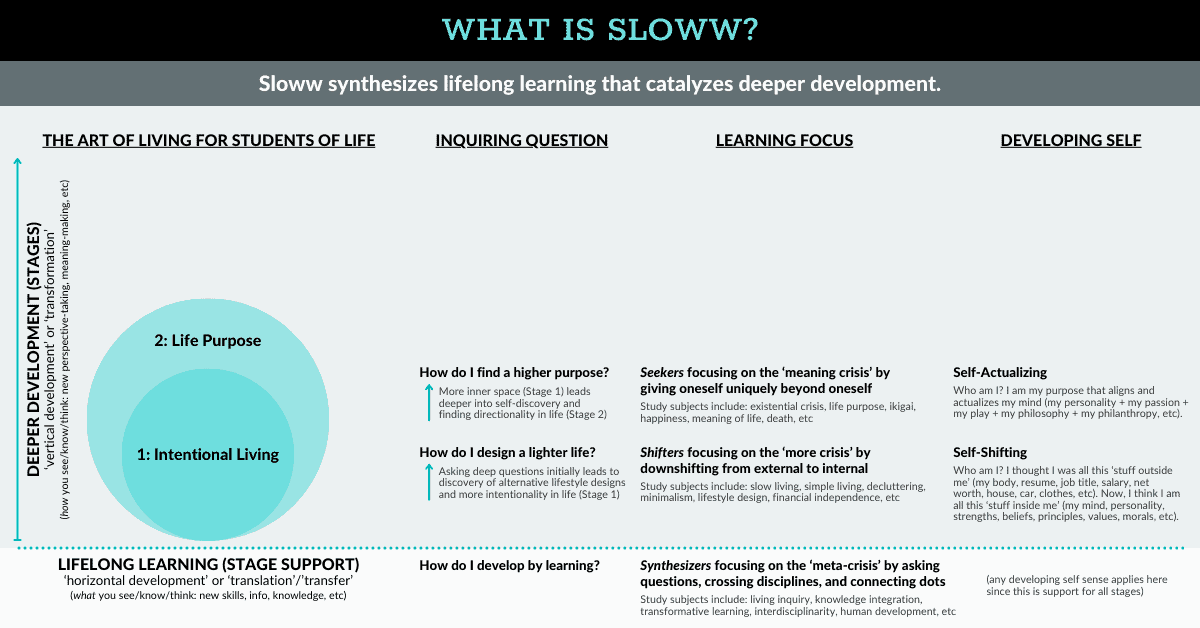
Sloww Stage 3: Mental Mastery
Stage 3 Inquiring Question:
- “How do I build a better mind?” More knowing thyself psychologically (Stage 2) leads deeper into all things mind and mentality (Stage 3). Along with the meaning crisis, humans (individually) and humanity (collectively) also seem to be in the midst of a sensemaking crisis in the information era—our knowledge and wisdom isn’t keeping pace with our technological advancement.
Stage 3 Learning Focus:
- Sensemakers focusing on the ‘memetic crisis’ by building a robust mental immune system (study subjects include: biology, psychology, socialization, systems thinking, cognitive biases, mental models, memes, polarities, knowledge, philosophy, birth lottery, free will, etc.
Stage 3 Developing Self:
- Self-Questioning: Who am I? ‘I’ am not sure, but ‘I’ am sure that ‘I’ am not who ‘I’ thought ‘I’ was ‘my’ entire life up to this point. If ‘I’ did not choose/create ‘my’ mind, how can ‘I’ even call it ‘my’ mind? ‘I’ thought ‘I’ previously questioned everything, but ‘I’ never questioned ‘my’ questioning (‘my’ own mind)!
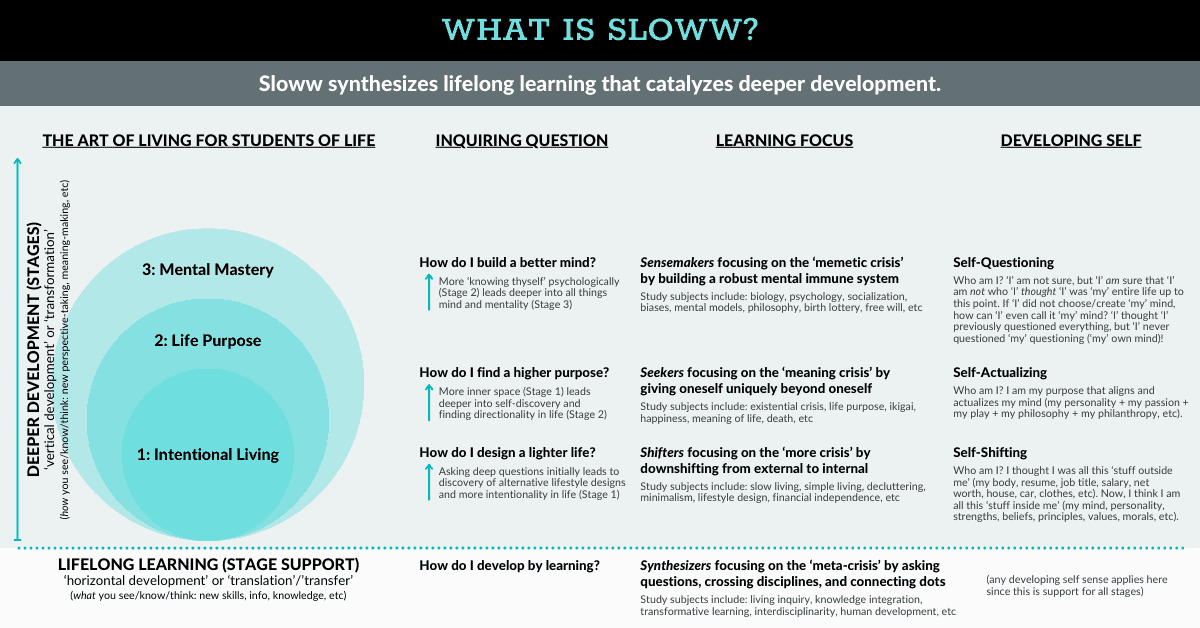
Sloww Stage 4: Spiritual Seeing
Stage 4 Inquiring Question:
- “How do I see beyond mind?” All roads lead deeper into mind (Stage 3), and mind leads beyond mind in nonduality (Stage 4). My most recent realization on this journey was that the previous stage 3 needed to be separated into two distinct stages: the mind (stage 3) and beyond the mind (stage 4). Sloww synthesizes the timeless art of living for our modern world because we aren’t taught how to live in school or the workplace—how to be conscious and holistic humans who live fully alive.
Stage 4 Learning Focus:
- Seers focusing on the ‘me crisis’ by transcending mind and living in the unfolding flow (study subjects include: spirituality, nonduality, self-enquiry, witnessing, awareness, truth, consciousness, enlightenment, etc).
Stage 4 Developing Self:
- Self-Witnessing & Self-Transcending: Who am I? ‘I’ know ‘I’ am not ‘my’ mind since ‘I’ am now aware of and able to witness ‘my’ mind. So, who am I? I am.
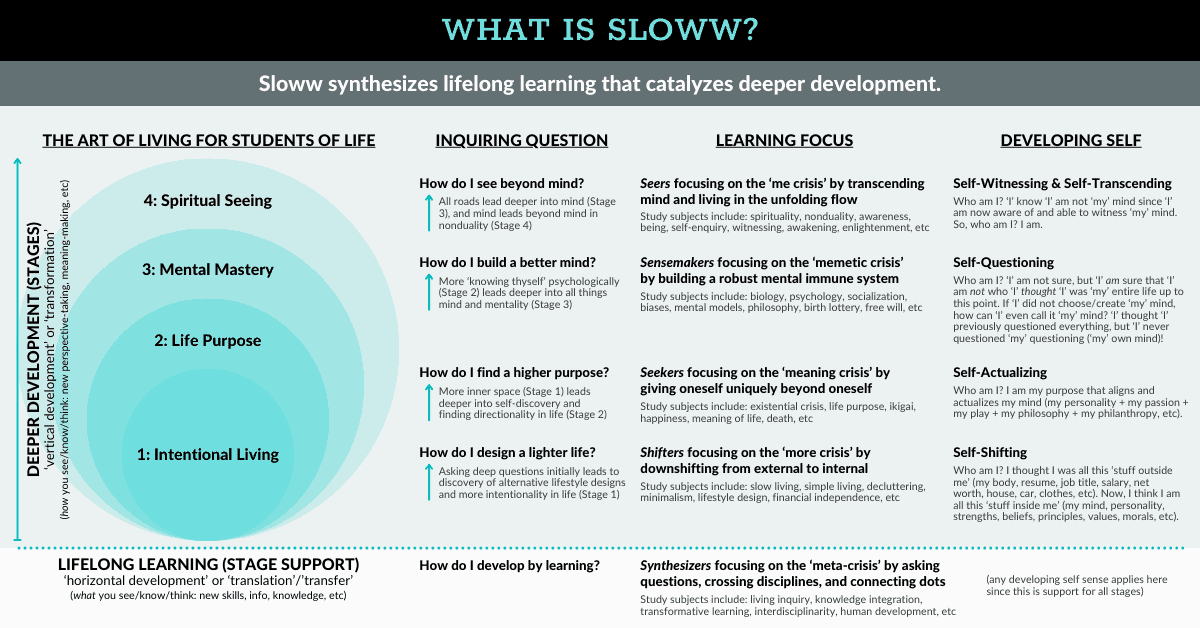
Where is Sloww going in the future?
Here’s my full reading list (Google Spreadsheet). I’ve currently read roughly 25% of the list. If you browse the remaining books, here are some of the topics I’m interested in exploring more (not in any particular order):
- Science & Nature: universal laws/principles, physics, biology, neuroscience, evolution, emergence, biomimicry, complexity, civilization, etc.
- Psychology, & Thinking: learning science/theories, information ecology/commons, systems thinking, metacognition, memes/memetics, mimesis/mimetic desire, storytelling, polarities, paradoxes, etc.
- Philosophy, Spirituality, & Indigenous Wisdom: The Bhagavad Gita, The Upanishads, The I Ching, The Bible (Jesus’ words), enlightenment, nonduality, consciousness, truth, reality, free will, etc.
- Personal Sovereignty: self-sufficiency, self-reliance, resilience, lifestyle design, meta-crisis, Game B, FIRE, futurism, etc.
- Physical Health: MEDS (meditation, exercise, diet, sleep), biohacking, supplements, microbiome, quantified self, nervous system, etc.
Why the name “Sloww”?
Obviously, Sloww at stage 1 makes the most explicit sense:
- In Nov 2015, I was in the midst of an existential crisis. I had been working 60/70/80-hour weeks consistently for the better part of a year. I was consumed by busyness. And, I tried to offset my hard work with lifestyle inflation (hint: didn’t work). On Christmas Eve 2015, I bought the domain name. On Christmas Day 2015, I emailed my dad: “Just bought the domain Sloww.co. Not sure what I want to do with it yet, but I’ve been inspired reading about downshifting, minimalism, simple living, and the slow movement.” My crisis was the beginning of the end of my glorification of busy and unconscious consumption—and the beginning of my awakening to intentional living and beyond.
Fun Fact: Someone once asked me why Sloww ends in “ww”:
- It’s just a fun play on the word “slow” that adds some emphasis and extra meaning—like when you catch yourself speeding through life or reacting too quickly and mentally tell yourself to “slowwww down.” It also represents the slowness needed to be present and dive deeply into anything in life (as outlined below).
The name is intentionally contrarian on multiple levels:
- The word “slow” often has negative connotations especially related to learning (e.g. “he’s a little slow”). Most things today are about faster being better. But, is that really true of the most important things in life? “Sloww” makes you pause, question, and think. It’s also an explicit reminder for when you think you certainly know something for sure (as in, “not so fast, slow down”).
Sloww at stages 2-4 is a bit more implicit:
- Slowness as it relates to intentional living is just the beginning. It turns out slowing down is the gateway to create space to discover purpose, the gateway to the mind, and the gateway beyond the mind.
The name could even be an acronym for how I sum up my own purpose:
- Sloww = Synthesizing Lots Of Worldly Wisdom or Synthesizing Levels Of Worldly Wisdom
The name also encapsulates my thinking and writing process:
- All of these processes are slow and time/attention/energy-consuming (going wide and deep): researching, curating, reading, note-taking, summarizing, synthesizing, and writing.
The name also implies compounding that only happens over the long-term:
- Building a mental latticework of knowledge is slow and compounds over time. Building a business is slow and compounds over years. Human development is slow and evolves/emerges over decades. Mother Nature takes her time over generations, centuries, and beyond.
Lastly, or most recently, I’ve been thinking about what the name means related to spiritual realization and journeying from thinker to truth. The acronym here could be something like:
- Sloww = Seeing Looking Observing Witnessing Watching
It turns out the simple idea of slowing down was just the seed—it continues to evolve and emerge. And, I feel like I’m just getting started.
Reader Feedback Request:
- What is Sloww to you (in your own words)?
- Has Sloww helped you in one or more of the four stages mentioned above (or with something else)?
- How has Sloww actually impacted your life?
Anything goes here. I’d love to better understand Sloww through your worldview and words. If you’re comfortable sharing publicly, please leave a comment below. If you’d rather message me privately, please reach out via email or social media.
You May Also Enjoy:
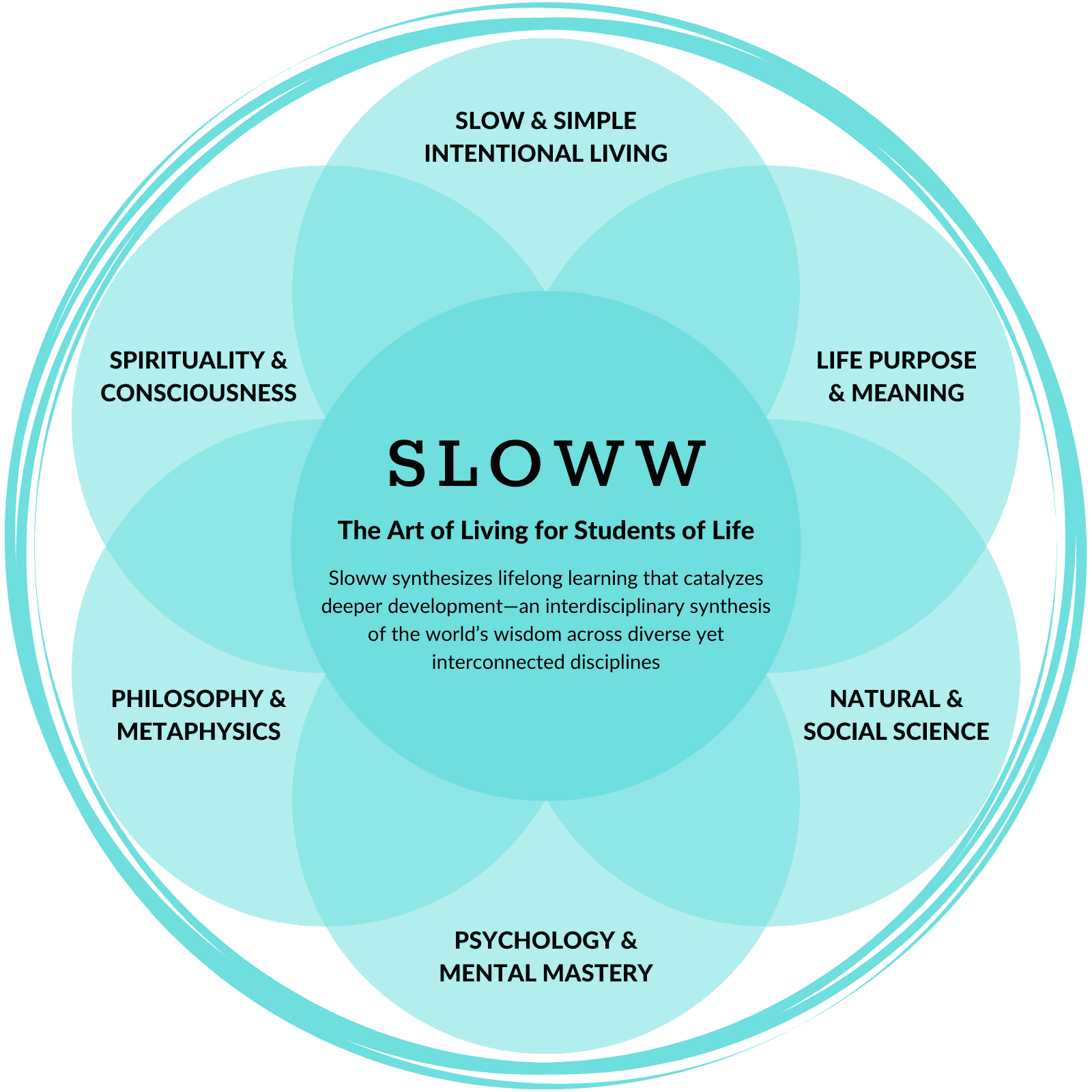





Stumbled across your site when searching for a summary of Rick Warren’s Purpose Driven Life. I like what you’ve done and are doing. This is not spam, just a rare, friendly hello and well-wish from a stranger; the kind that used to be commonplace when societies flourished on communal living.
I truly appreciate the friendly hello, Johnben! 👋
Thank you for sharing your journey and experience with others so that they too can find their own path. I’ve been in an existential crisis since I turned 50 and I have begun to realize that the answers lie within me and I must create the space and time to unravel the mystery. I love your roadmap and appreciate the wisdom you share.
Hi Kyle
I also bumped into your website by accident. I was browsing for a summary of the untethered soul to discuss it with a student(I’m an online English teacher). It’s a very interesting project you’ve got here. I was a former (paid) subscriber to a similar site called “piercing the veil of reality” and I still get their newsletter. My spiritual awakening(which seems to be the norm for everybody) was also born out of an extreme/depressing situation. I have also read the Ikigai book by Miralles and Garcia. I even bought the Japanese citrus fruit concentrate that they recommend drinking in the mornings. Is your Ikigai a summary of theirs or is it your personal take on Ikigai? Keep up the good work.
Good question, Elias. I have a bunch of posts on ikigai. While I do have a summary of the Héctor García and Francesc Miralles book, it’s not what I recommend to people because it’s not the truth about ikigai. After learning about the concept for 5+ years, I created my own ikigai eBook that synthesizes everything I learned and introduces a new concept I call “Ikigai 2.0.”
Hey Kyle!
I will make this comment serve two purposes:
1. Feedback for you about this post.
2. What I take away from this read.
1. Let me tell you Kyle, although I have been in and out of the Sloww website for the last year, reading this post made the platform feel fresh and novel in my mind. Thanks to the simple and powerful roadmap you present in this post, I leave inspired to get my ducks in a row and focus on what is most important in my life. There is a saying that the best information will always find you… well this post found me at right the perfect time. Gracias!
2. Sloww resonates with every fiber of my being. There is no doubt of this and I feel greatly blessed that resources like these exist in my experience of life. Sloww highly motivates me to keep on fueling my passions and living the life I deeply desire. Nothing happens overnight, a myth modern culture has installed in my mind. In order to break out of that view point I am creating my own map with personal milestones along the way and focusing only the next mountain range, everything else can wait and be put to the side for the time being. Simplifying my life is possible, take out the noise and focus on the signal.
Thanks for reading Kyle and keep doing what your doing!
All the best,
Pablo
This is all amazing to hear! Thanks so much, Pablo, and good work on everything you are doing in your own life!
I consider myself a Student of Life, wholeheartedly committed to answering the question: “How do I live the most fulfilling, flourishing life possible?” Sloww is BY FAR the best comprehensive resource for answering that very question.
Kyle is truly a masterful synthesist but also more importantly a REALLY AWESOME approachable, modern day Philosopher King and dedicated craftsman. I’m so grateful for the work he does – sharing wisdom, connecting dots and maybe most importantly to me bringing together other wisdom lovers. Keep up the AMAZING work Kyle. THANK YOU!! 🙏🙏🙌🙌🥸🥸🥸
After spending a few hours on your website this past week, I am convinced that we are natural allies, and I would like to explore how we might work together to help each other. I have sent you a private email with more about me, and why I want to help you.
It also has an attachment that I think you will find of value.
This is a wonderful site. Thank you for all you do.
Hello, Kyle.
I’m Amandeep and I also stumbled upon Sloww just by accident, I guess that’s how we come across extra ordinary things in life. I’ve been reading a bit about intentional living and minimalism since some time and searched the web regarding Mahatma Gandhi and his philosophy of simple living since he is seen as an idol on simple living, just wanted to know about his way of life and then I came across an article on your website on Mahatma Gandhi, although the article was quite short but it couldn’t have been more beneficial since I discovered another noble soul, that is you through it. I am looking forward to have a long spiritual, informative and intentional journey with you. Thank you so much.
Hello Kyle!
I hope you are doing well!
I come from your page ‘Meta crisis-Meta resource’. Enthusiasm for Daniel’s words and thoughts is enough for me to feel connected. I am a media scientist and failed artist in the middle of my existential crisis. I like everything I’ve read on this site so far. I now have my ‘adult ADHD’ diagnosis and am in therapy. I got rid of all my horrible jobs and now have everything I need to start my life. Posting a comment here seems like a sensible step. Please don’t expect a big commitment from my side in the near future, I have to adapt to the course of therapy. I see a lot of potential in your perspective and networking. Hope to see you soon!
Ed